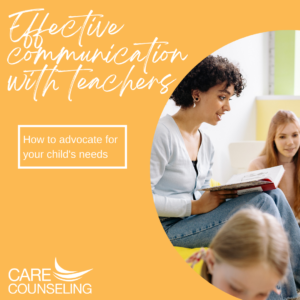Effective Communication with Teachers
 As a parent or caregiver, you play a crucial role in your child’s education and overall well-being. Effective communication with teachers is essential for advocating for your child’s unique needs and ensuring they receive the support necessary to thrive academically and emotionally.
As a parent or caregiver, you play a crucial role in your child’s education and overall well-being. Effective communication with teachers is essential for advocating for your child’s unique needs and ensuring they receive the support necessary to thrive academically and emotionally.
- Establish a Positive Relationship:
Building a positive and collaborative relationship with your child’s teachers is the foundation for effective communication. Attend parent-teacher conferences and other school events to get to know the teachers and understand their teaching styles and expectations. This will help you establish trust and open lines of communication.
- Initiate Communication Early:
Don’t wait for issues to arise before reaching out to your child’s teacher. Initiate communication early in the school year to introduce yourself and express your commitment to supporting your child’s education. Let the teacher know that you are available for communication and that you value their feedback.
- Be Respectful and Appreciative:
Approach all communication with teachers in a respectful and appreciative manner. Teachers have a challenging job and play a significant role in your child’s life. Express gratitude for their efforts and show understanding for the demands of their profession.
- Share Important Information:
Inform your child’s teacher about any relevant information that may impact their performance or behavior in the classroom. This could include medical conditions, recent changes in the family, or learning challenges. Sharing this information can help the teacher better support your child’s needs.
- Be Specific About Concerns:
When discussing concerns or issues, be specific and provide concrete examples. Avoid making general statements or assumptions. Instead, focus on observable behaviors or specific incidents that require attention or clarification.
- Actively Listen to the Teacher:
Effective communication is a two-way process. Actively listen to the teacher’s perspective and feedback about your child. Be open to constructive criticism and be willing to work together to find solutions.
- Be Solutions-Oriented:
Approach conversations with a solutions-oriented mindset. Instead of dwelling solely on problems, work collaboratively with the teacher to identify strategies and interventions that can support your child’s progress.
- Ask for Regular Updates:
Request regular updates on your child’s academic progress and behavior. This will help you stay informed about their performance and address any concerns promptly.
- Request an Individualized Education Plan (IEP) or 504 Plan if Necessary:
If your child has specific learning or behavioral needs, you may request an Individualized Education Plan (IEP) or a 504 Plan. These plans provide formal accommodations and support tailored to your child’s unique needs.
- Follow Up on Action Steps:
After discussing concerns and action steps with the teacher, be proactive in following up on progress. Check in regularly to see how the strategies are working and whether adjustments are needed.
Effective communication with teachers is essential for advocating for your child’s needs and supporting their academic and emotional growth. Building positive relationships, sharing information, and being respectful and appreciative are key components of successful parent-teacher communication. By actively engaging with your child’s teachers and working collaboratively to address challenges, you can ensure that your child receives the support they need to excel in their educational journey. Remember, your involvement and advocacy play a vital role in your child’s success in school and beyond.



























